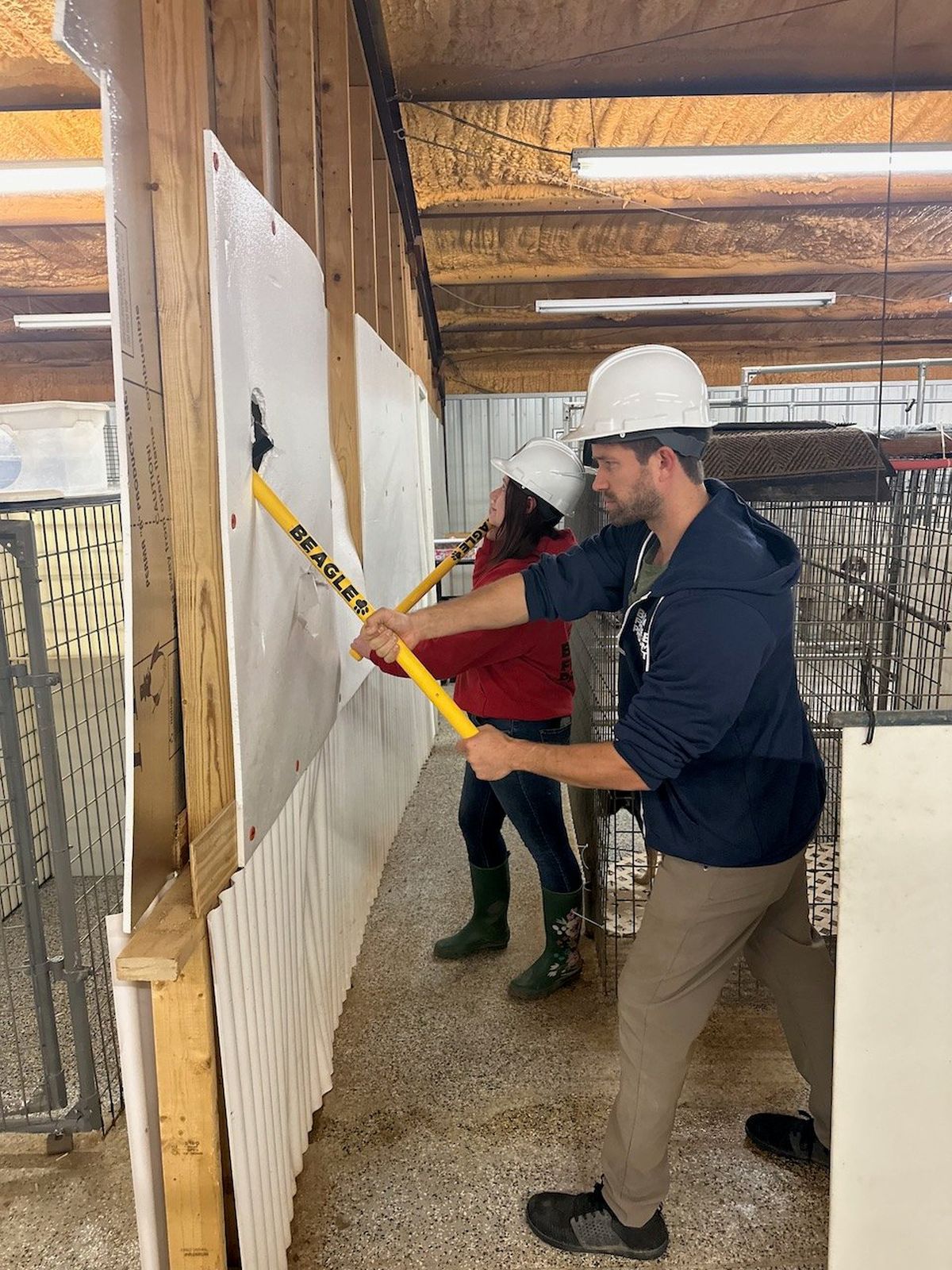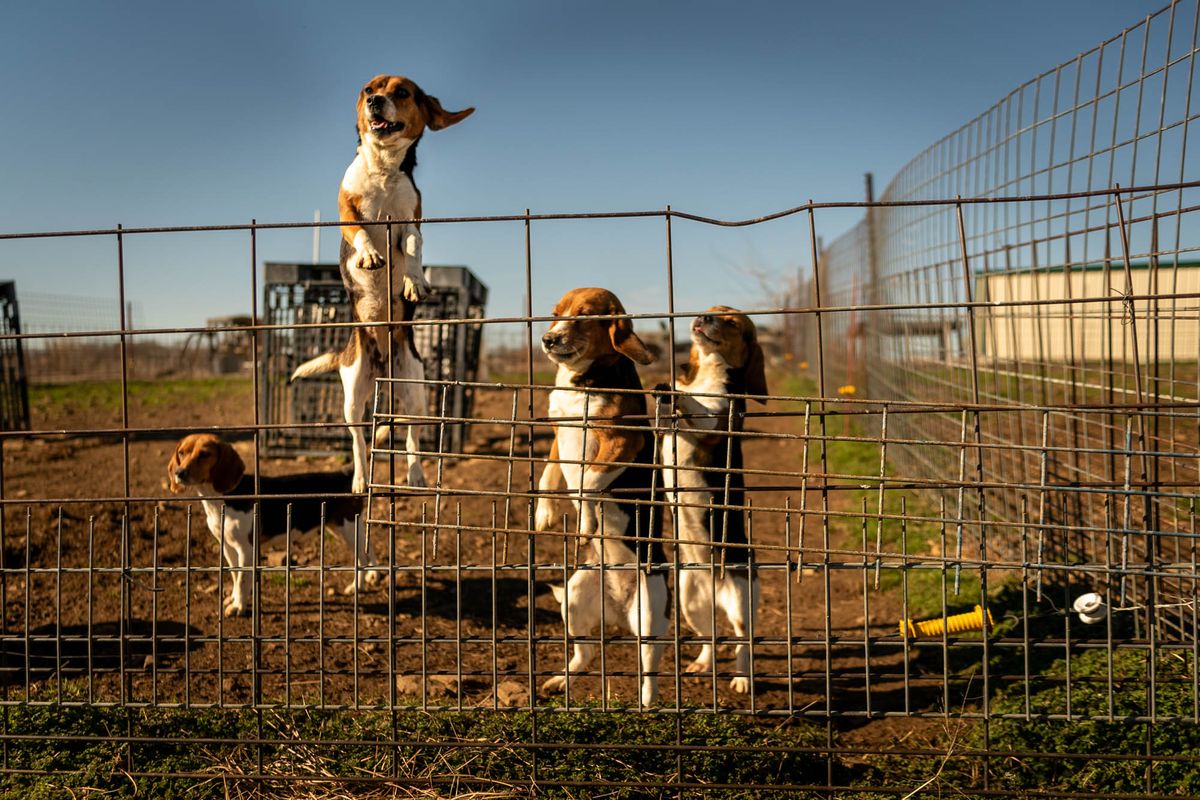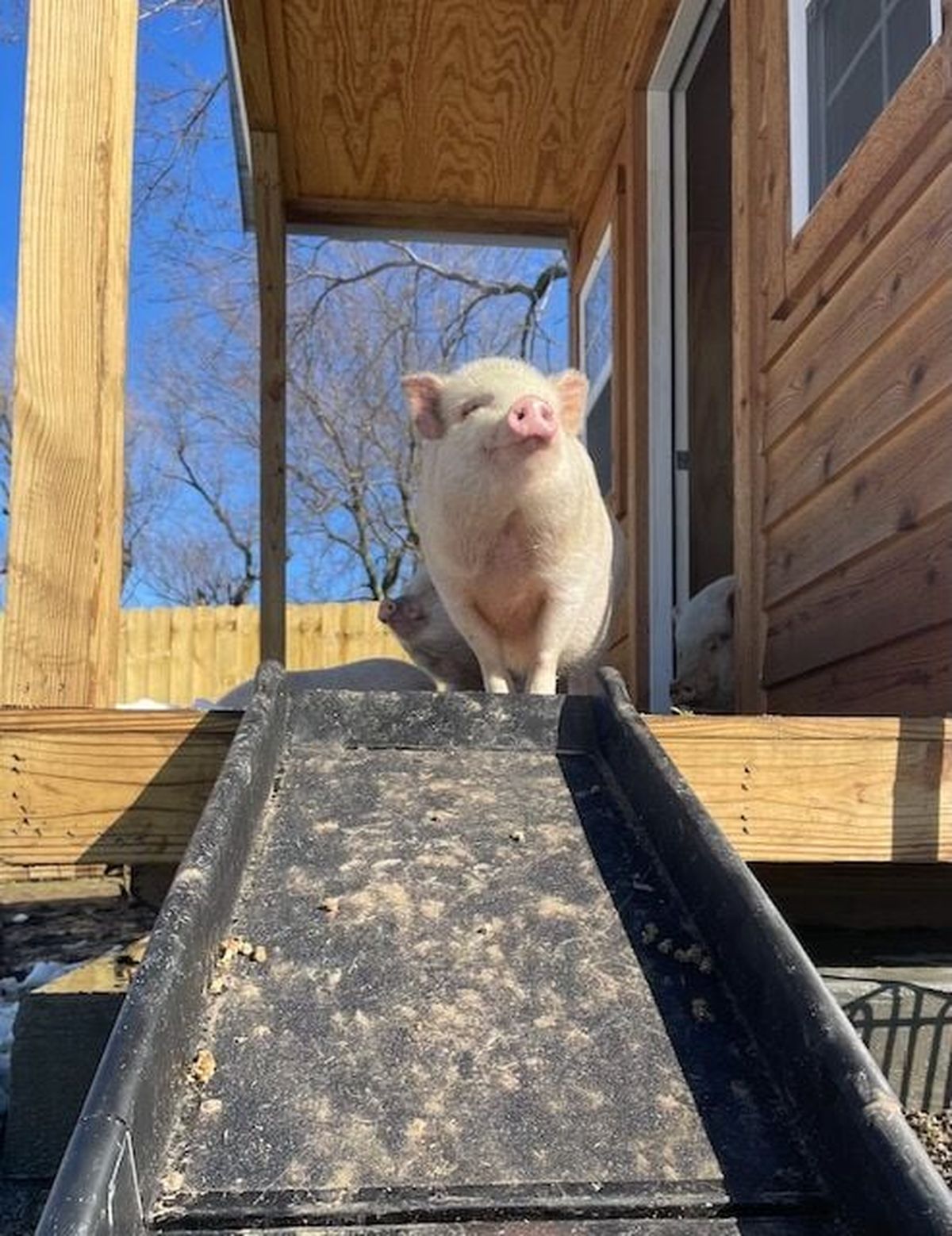She bought an animal testing site and turned it into a rehab sanctuary
Lab beagles living outdoors at an animal testing facility in Nowata, Okla. (GENE BLALOCK/)
Shannon Keith sends letters to animal testing labs around the country offering to take any animals they no longer use for research. She rarely gets a reply.
“They deserve a second chance at life when they’re done with them,” said Keith, an animal rights lawyer who founded Beagle Freedom Project in 2010 to rescue and rehome animals used in research.
Beagles are the most-used breed for testing, though Beagle Freedom Project, a Los Angeles-based nonprofit, rescues all animals.
John Riner – the owner of Animal Health Innovations, a dog and cat testing facility in Nowata, Okla. – had been receiving Keith’s letters for years, but in 2021, he replied to her for the first time.
As a contract researcher for flea and tick products, Riner would euthanize lab animals – a common practice in the industry – if they had health issues or couldn’t find a home after testing. Riner said he kept the test animals alive for as long as he could.
He began giving Beagle Freedom Project the dogs and cats he no longer needed for research purposes, after a Department of Agriculture inspector flagged concerns over the poor condition of some of his senior dogs.
“I did a little soul-searching, and I didn’t want to euthanize any dogs,” said Riner, 69. “It’s just hard to find a home for that many.”
Riner had about 150 dogs on his property at a time and he would reuse them for experiments rather than euthanize them, he said. When dogs were not involved in a study, which generally lasted between 60 to 90 days, he kept them outdoors.
“Dogs are designed to withstand weather,” he said. “Dogs weren’t meant to live with man; man created that.”
He said he believes animal testing is important to ensure products are safe and effective.
“Yes, the dogs go through slight discomfort,” Riner said. “We’re not mistreating animals.”
Keith and her team were delighted to hear from Riner.
“We started doing rescues at his facility in Oklahoma,” Keith said. “When he has groups of dogs and cats, we’ll go there and get them and place them in homes.”
Keith said that since launching her organization, she has rescued about 3,400 animals, including those at Riner’s facility.
“Even though we’re on completely opposite ends of the spectrum when it comes to using animals in research, I was glad that they could do that and give these dogs a quality of life toward the end,” Riner said.
After visiting Riner’s facility a few times, Keith took note of his 30-acre property, which has several ponds and sprawling fields.
“It’s a gorgeous piece of land,” Keith said.
She thought it would be the perfect place for an animal sanctuary. A few months ago, she pitched the idea to Riner.
“I assumed he was going to laugh me off the phone,” Keith said.
To her surprise, he told her he would think about it, as he was hoping to retire. He came back with an offer to sell her his business and his land; she declined. She offered instead to just the property, and after some negotiations, he accepted.
As part of the deal, Riner surrendered his contract research license and committed to no longer testing on animals. He also gave Keith custody of the more than 200 cats and dogs on his property.
“I was ready to retire, and the market itself has kind of gone through a post-COVID slow-down,” Riner said.
Plus, he added, “I appreciate Beagle Freedom for what they do.”
The sale was finalized on Feb. 8, and the testing facility was shut down. Since then, Keith and her team have been transforming the property – which they called Freedom Fields – into a rehabilitation site for former lab animals, many of whom are scared and anxious, and have health issues including seizures, arthritis and cataracts.
“They are very afraid of any noise they’ve never heard before. Their very first instinct is to run,” said Keith, adding that dogs have GPS trackers on their collars in case they bolt.
Keith’s plan is to open a senior dog center on the property, with orthopedic beds, water treadmills and ramps to help older pups who spent their lives as test subjects regain strength and learn socialization skills before they are rehomed.
“Our ultimate goal, of course, is to get them into homes, and until that happens, they are going to live there in the most luxury they could ever have,” Keith said.
She also plans to create a space that caters to cats, as well as an education center.
“We want the public to come. We want to take them around to meet the survivors and teach them about animal testing,” Keith said.
In addition to rescuing and rehoming lab animals, Beagle Freedom Project also focuses on advocacy. Its Beagle Freedom Bill – which requires labs to offer healthy dogs and cats for adoption once experiments have ended – has been passed in 13 states, including California, Maryland and Virginia. The organization is working to make the bill federal law.
Beagle Freedom Project also created a free app called Cruelty Cutter, which helps consumers scan products to see whether they have been tested on animals.
Since the FDA Modernization Act 2.0 was passed in December 2022 – allowing the use of alternatives to animal testing to investigate the safety and efficacy of new drugs – Keith said she is hopeful that the animal testing industry will keep declining.
In the meantime, Freedom Fields will be a haven for animals that have been abused and traumatized in laboratories, she said.
“This has never been done,” Keith said. “Nobody has ever closed down an animal testing facility and turned it into a rehab sanctuary.”
Renovations on the property are underway.
“We have a lot of work to do. We are a small nonprofit, our budget is small, but we’ve got dedicated employees and volunteers,” said Keith, noting that her organization is mostly funded by individual donations.
Emily Clayton, a rescue manager for Beagle Freedom Project, moved from Los Angeles to Nowata in February to live on the property.
“It’s been amazing,” said Clayton, 35. “They’re getting much better care than they were before, and we’re making such positive changes every day.”
About 127 dogs and cats have been spayed and neutered, and volunteers are working to get all the animals healthy so they can find forever homes. To date, more than 40 animals are being fostered, and 16 have been adopted.
“It’s the most rewarding thing ever,” Clayton said.










